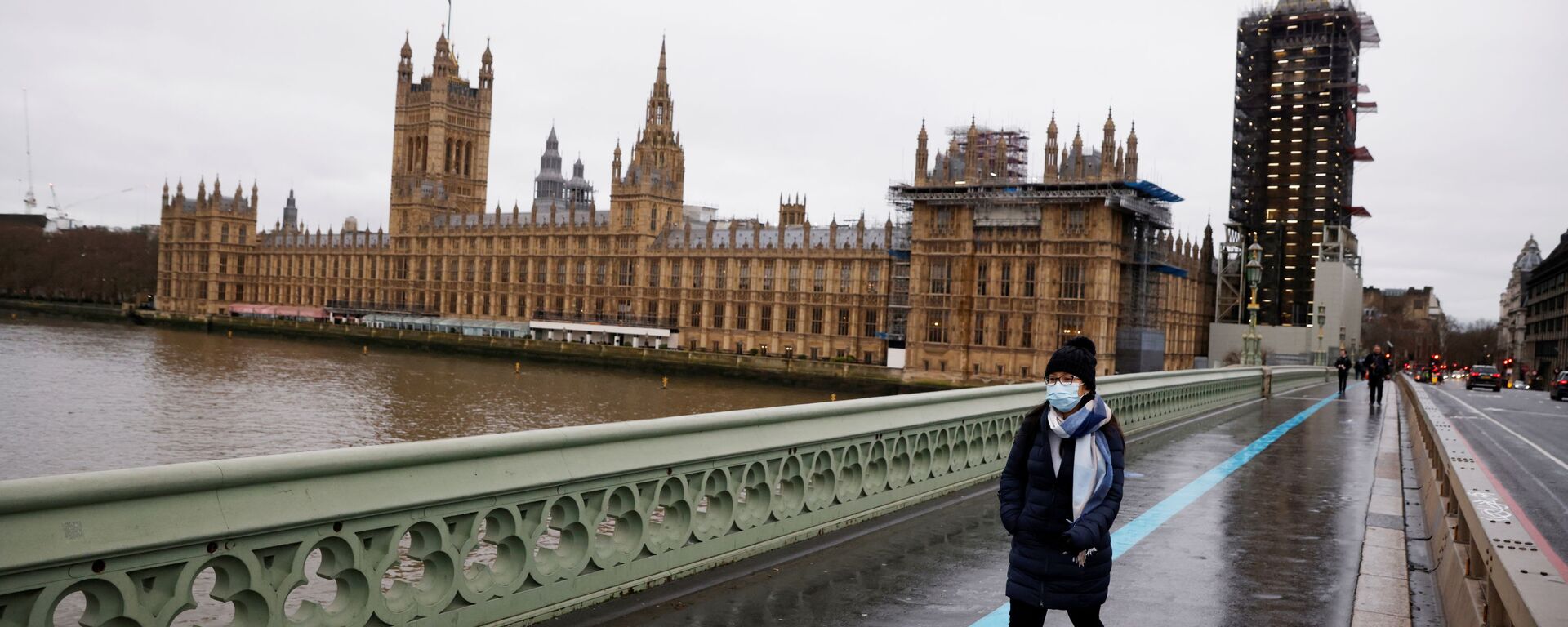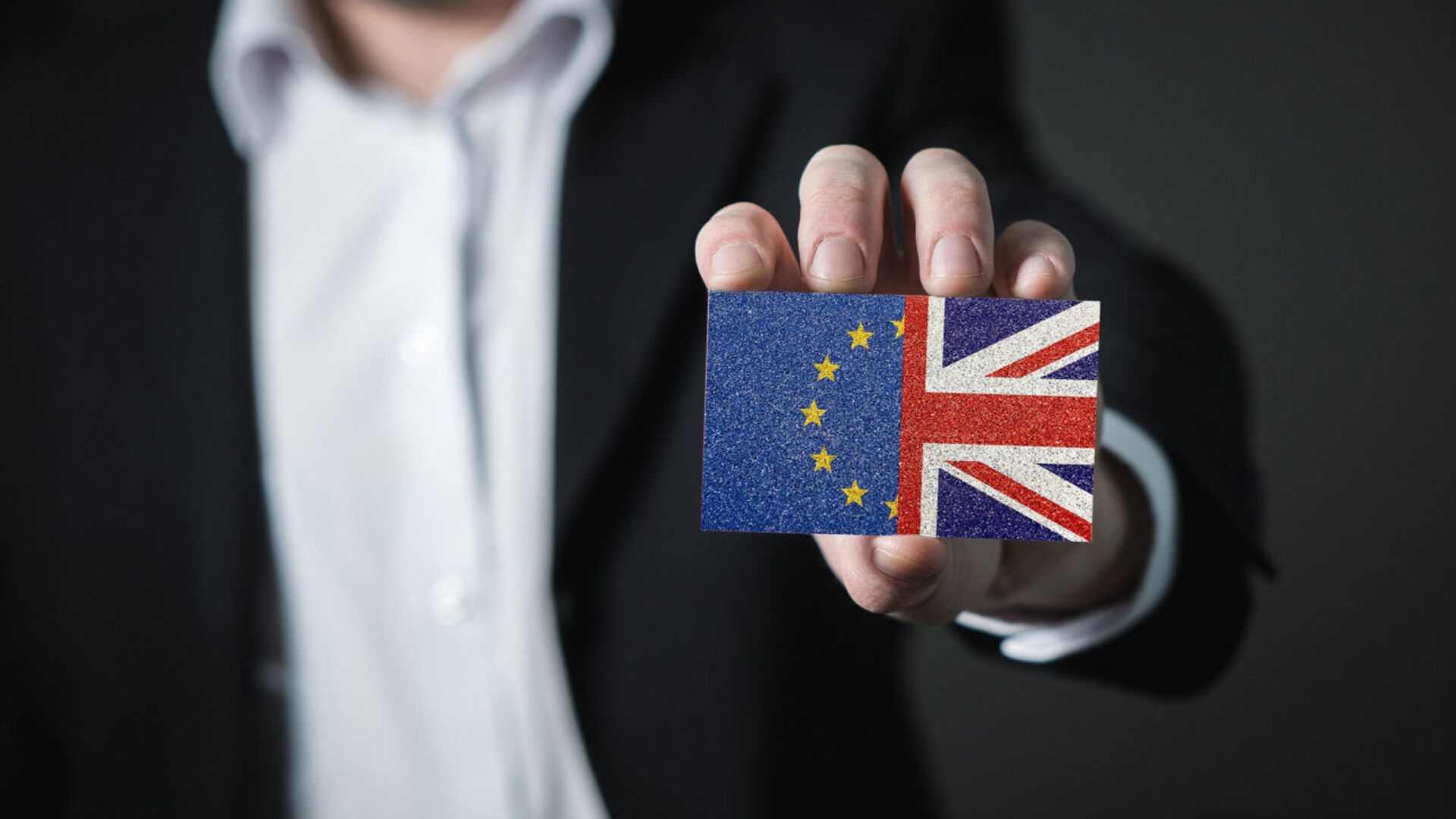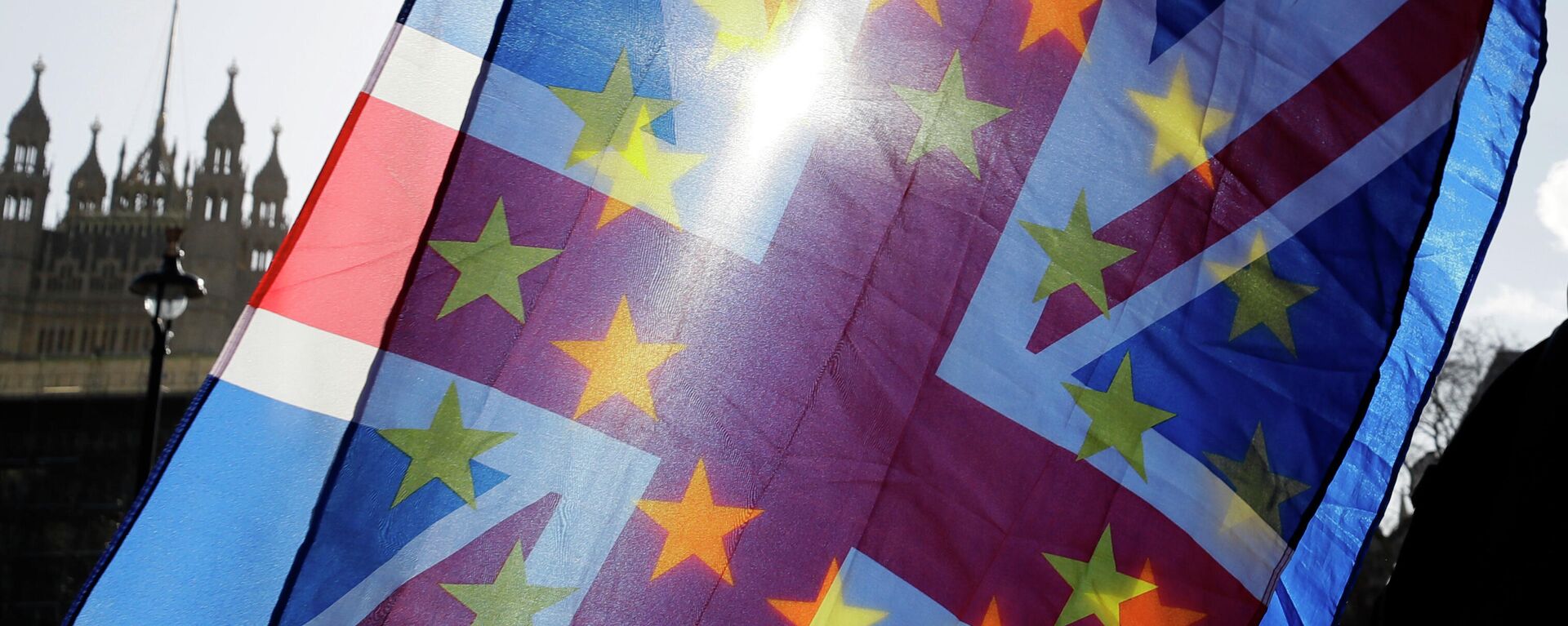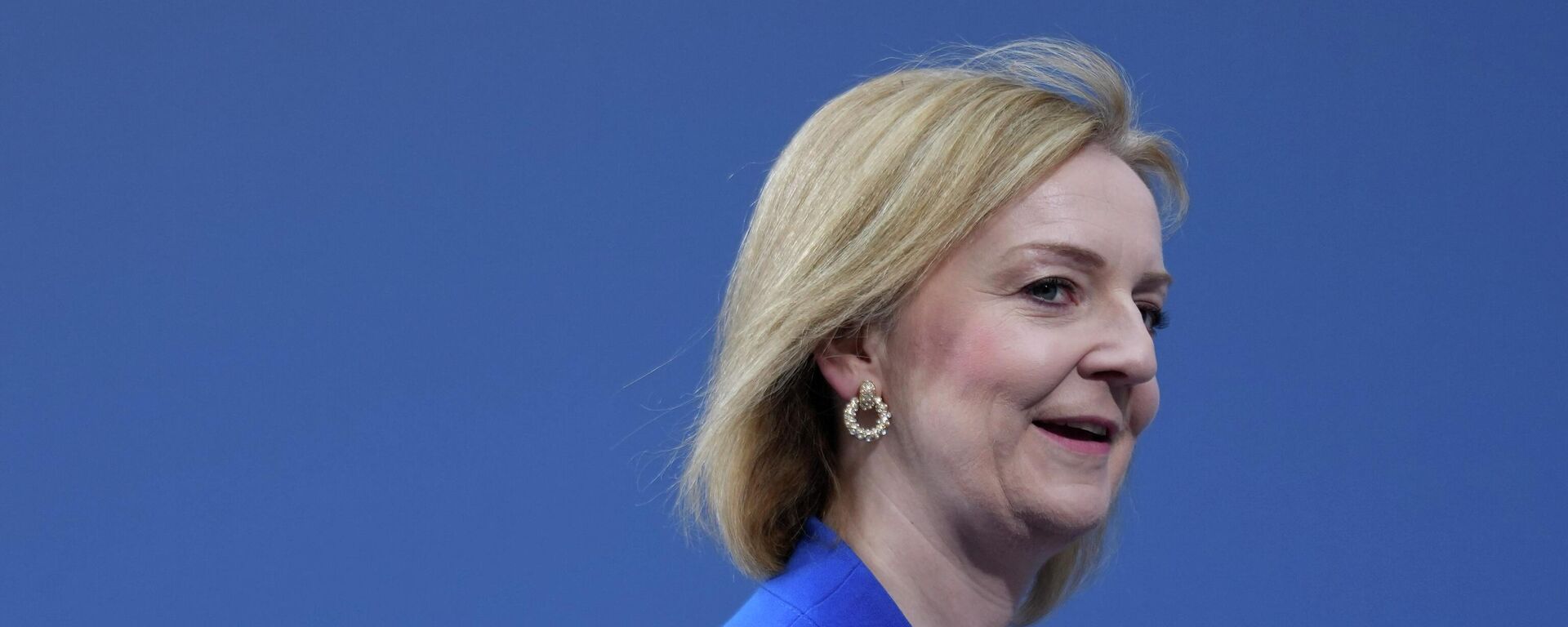https://sputnikglobe.com/20230101/life-outside-the-bloc-how-did-brexit-take-place-1105977616.html
Life Outside the Bloc: How Did Brexit Take Place?
Life Outside the Bloc: How Did Brexit Take Place?
Sputnik International
In June 2016, over half of Brits who voted in the referendum on the UK's exit from the EU backed the country's independence from the bloc
2023-01-01T15:30+0000
2023-01-01T15:30+0000
2023-05-28T15:25+0000
sputnik explains
brexit
deal
withdrawal
agreement
boris johnson
ursula von der leyen
european union (eu)
united kingdom (uk)
https://cdn1.img.sputnikglobe.com/img/07e4/09/01/1080340190_0:14:1280:734_1920x0_80_0_0_713aa559cf9c822f082efb1fd56a445e.jpg
January 1 marks the second anniversary since the terms of the UK's pullout from the EU came into force. Let’s look back at Britain's thorny path to independence from the bloc.Referendum on the UK Leaving the EUWell before Brexit occurred, British Conservative Prime Ministers Margaret Thatcher and David Cameron used Eurosceptic rhetoric while being in favor of the UK's membership and the development of the European Single Market.Euroscepticism, especially the impact of the UK Independence Party on the Conservatives' election results, added to Cameron's 2015–2016 attempt to renegotiate the UK's membership in the EU, and finally resulted in the holding of the 2016 referendum.As far as Thatcher is concerned, she at first supported the common market and the Single European Act, but in her Bruges speech of 1988 warned against "a European super-state exercising a new dominance from Brussels."She influenced Tory member Daniel Hannan, who founded the Oxford Campaign for Independent Britain and was one of the founders of the Vote Leave campaigning organization. According to a UK media outlet, “With hindsight, some see this as the start of the campaign for Brexit”.On 23 June 2016, the UK held a referendum to answer the question: "Should the UK remain a member of the EU or leave the EU?" By a margin of 51.9% to 48.1%, Brits voted to leave the bloc, a move that is now commonly referred to as Brexit.Implementation of BrexitUp until the end of December 2020, a Brexit transition period was in place in Britain. During that time, the UK continued to comply with all EU laws and rules, with negotiations being held on the new relationship between Brussels and London.On December 24, 2020, negotiators for the EU and the UK clinched a last-ditch deal on the two parties’ new relations, the so-called Brexit Withdrawal Agreement, or Agreement on the withdrawal of the United Kingdom of Great Britain and Northern Ireland from the European Union and the European Atomic Energy Community.The document, which was announced by European Commission President Ursula von der Leyen and then-UK Prime Minister Boris Johnson, covered, in particular, finance-related issues, citizens' rights, border arrangements and dispute resolution. It also contained a transition period and an outline of the future relationship between the UK and the EU.The parties thus managed to prevent the introduction of the World Trade Organization's rules, including customs tariffs and full border checks for goods flowing across the English Channel.The withdrawal agreement came after months of tough negotiations that were particularly stalled due to issues over fisheries access and a level playing field for social, labor and environmental issues, as well as Northern Ireland.Freedom of Movement Under the deal, freedom of movement for EU nationals into the UK ended and was replaced by a points-based immigration system, meeting a key demand of the Brexit project. British nationals were no longer able to freely live, work, study or open businesses in the EU. Moreover, visas were secured for stays in the EU of over 90 days.Moreover, the Erasmus European universities exchange program was no longer applied to most of Britain. The Irish government, however, said that students in Northern Ireland would be able to continue using the Erasmus scheme in order to ensure that they “will never be left behind” citizens in the Republic of Ireland.Level Playing Field A state in which conditions in a competition or situation are fair for everyone is known as a level playing field. Both parties agreed to a minimum level of social, labor and environmental standards below which neither side must go. EU Commission President Ursula von der Leyen noted that there will be a review after four years to ensure that the level playing field is functioning properly.The UK agreed to a “rebalancing mechanism” which means that either side can carry out a formal review of the deal’s economic and trade components including the minimum level of standards. Moreover, the EU could respond with sanctions in the form of tariffs if Britain puts its companies in an unfair position of advantage by lowering trading standards or if those standard diverged over time, and vice versa. As part of this effort, both sides also agreed on a “non-regression” clause, which says that they will not lower standards in any effort to pull the rug out from one another on trade.Fisheries The agreement stipulated that the UK will leave the common fisheries policy. Currently, the yearly turnover of European fishing vessels from UK waters is about €650 million ($697 million), while the UK’s fleets bring in approximately €850 million ($911 million). Under the new post-Brexit trade deal, the EU’s quota will be reduced to 25% over the next five and a half years.About a quarter of the EU’s catch, about €162.5 million ($174 million) a year, will be “repatriated” to UK vessels by the end of the five and a half years period from 2026. Following that, the two sides will enter into negotiations over future terms relating to the regulation of fish catches.The EU also ditched its so-called “hammer” demand that it could slap economic sanctions on any UK sector it wanted if it did not get its own way on fisheries. European boats that catch fish 12 nautical miles from British coasts will be able to continue doing so during the five-and-a-half-year transition period, following which future access will be negotiated on an annual basis.In late 2021, 14 EU member states, including Denmark, France and Germany, prepared a joint declaration accusing the British government of causing "significant economic and social damage" to their fishing communities following Brexit.The signatories called on the UK to act "in the spirit and the letter" of the Brexit deal. The UK and its crown dependencies, including Jersey, previously sparked European ire by reducing the number of licenses given to small boat owners from 14 EU countries.The Northern Ireland ProtocolThe withdrawal agreement envisages that Northern Ireland will have to continue following the single market regulations in order to ensure that its border with The Republic of Ireland can stay open. There will be customs processed for products crossing the Irish Sea because Northern Ireland will continue to have access to the EU’s customs union while simultaneously remaining part of the UK customs union. Moreover, the north will still be subject to the many laws of the European Court of Justice.Under the Northern Ireland Protocol, all goods and animal-based products coming from the rest of the British territories must be checked upon arrival to Northern Ireland to ensure their compatibility with EU sanitary regulations.In July 2022, the UK government introduced a bill unilaterally revising the provisions of the Northern Ireland Protocol, arguing that the deal is not working as it causes delays and interruptions to goods moving between the United Kingdom and Northern Ireland. This move drew the ire of the EU and spurred Brussels to take legal action against London, a spat that has yet to see signs of being finally settled.Talks between EU and UK officials on the protocol resumed in October 2022 amid reports that London is prepared to back down on the role of the European Court of Justice to clinch a consensus with the EU.As for the UK bill, it stipulates the establishment of a "green channel" for goods transported from the UK to Northern Ireland, as well as the change in the tax rules, stripping the European Court of its role as the sole arbiter of disputes.Will Brexit Remain?The government of UK Prime Minister Rishi Sunak is expected to pursue the policy of developing friendlier relations with the EU as compared to a political line carried out by his predecessors, Liz Truss and Boris Johnson.However, both the Conservatives and Labour have reportedly ruled out any return to EU-aligned institutions for fear of disenfranchising voters in key pro-Brexit constituencies.Even so, recent polls have suggested that the public mood has likely started to change. A YouGov survey conducted in November 2022 showed that 56% of the population said that Britain was “wrong” to vote to leave the EU in 2016, in comparison with 32% of respondents who insisted it was the right move to make.
https://sputnikglobe.com/20220622/brexit-increases-cost-of-living-in-uk-resolution-foundation-think-tank-says-1096571832.html
https://sputnikglobe.com/20220517/uk-denies-scrapping-brexit-deal-ni-protocol-as--proposed-changes-unveiled-1095573165.html
https://sputnikglobe.com/20201230/its-not-the-brexit-deal-people-voted-for-but-it-protects-uks-sovereignty-political-analyst-says-1081611292.html
united kingdom (uk)
Sputnik International
feedback@sputniknews.com
+74956456601
MIA „Rossiya Segodnya“
2023
Oleg Burunov
https://cdn1.img.sputnikglobe.com/img/07e4/09/0b/1080424846_0:0:2048:2048_100x100_80_0_0_3d7b461f8a98586fa3fe739930816aea.jpg
Oleg Burunov
https://cdn1.img.sputnikglobe.com/img/07e4/09/0b/1080424846_0:0:2048:2048_100x100_80_0_0_3d7b461f8a98586fa3fe739930816aea.jpg
News
en_EN
Sputnik International
feedback@sputniknews.com
+74956456601
MIA „Rossiya Segodnya“
Sputnik International
feedback@sputniknews.com
+74956456601
MIA „Rossiya Segodnya“
Oleg Burunov
https://cdn1.img.sputnikglobe.com/img/07e4/09/0b/1080424846_0:0:2048:2048_100x100_80_0_0_3d7b461f8a98586fa3fe739930816aea.jpg
second anniversary of the terms of the uk's pullout from the eu coming into force, uk's withdrawal from eu, london-brussels spat over northern ireland protocol, brexit
second anniversary of the terms of the uk's pullout from the eu coming into force, uk's withdrawal from eu, london-brussels spat over northern ireland protocol, brexit
Life Outside the Bloc: How Did Brexit Take Place?
15:30 GMT 01.01.2023 (Updated: 15:25 GMT 28.05.2023) In June 2016, more than half of Brits who voted in the referendum on the UK's withdrawal from the European Union backed the country's independence from the bloc. The decision plunged Britain into a lengthy transition process before it finally left the EU on January 31, 2020.
January 1 marks the second anniversary since the terms of the UK's pullout from the EU came into force. Let’s look back at Britain's thorny path to independence from the bloc.
Referendum on the UK Leaving the EU
Well before Brexit occurred, British Conservative Prime Ministers Margaret Thatcher and David Cameron used Eurosceptic rhetoric while being in favor of the UK's membership and the development of the European Single Market.
Euroscepticism, especially the impact of the UK Independence Party on the Conservatives' election results, added to Cameron's 2015–2016 attempt to renegotiate the UK's membership in the EU, and finally resulted in the holding of the 2016 referendum.
As far as Thatcher is concerned, she at first supported the common market and the Single European Act, but in her Bruges speech of 1988 warned against "a European super-state exercising a new dominance from Brussels."
She influenced Tory member Daniel Hannan, who founded the Oxford Campaign for Independent Britain and was one of the founders of the Vote Leave campaigning organization. According to a UK media outlet, “With hindsight, some see this as the start of the campaign for Brexit”.
On 23 June 2016, the UK held a referendum to answer the question: "Should the UK remain a member of the EU or leave the EU?" By a margin of 51.9% to 48.1%, Brits voted to leave the bloc, a move that is now commonly referred to as Brexit.
Up until the end of December 2020,
a Brexit transition period was in place in Britain. During that time, the UK continued to comply with all EU laws and rules, with negotiations being held on the new relationship between Brussels and London.
On December 24, 2020, negotiators for the EU and the UK clinched a last-ditch deal on the two parties’ new relations, the so-called Brexit Withdrawal Agreement, or Agreement on the withdrawal of the United Kingdom of Great Britain and Northern Ireland from the European Union and the European Atomic Energy Community.
The document, which was announced by European Commission President Ursula von der Leyen and then-UK Prime Minister Boris Johnson, covered, in particular, finance-related issues, citizens' rights, border arrangements and dispute resolution. It also contained a transition period and an outline of the future relationship between the UK and the EU.
The parties thus managed to prevent the introduction of the World Trade Organization's rules, including customs tariffs and full border checks for goods flowing across the English Channel.
The withdrawal agreement came after months of tough negotiations that were particularly stalled due to issues over fisheries access and a level playing field for social, labor and environmental issues, as well as Northern Ireland.
Under the deal, freedom of movement for EU nationals into the UK ended and was replaced by a points-based immigration system, meeting a key demand of the Brexit project. British nationals were no longer able to freely live, work, study or open businesses in the EU. Moreover, visas were secured for stays in the EU of over 90 days.
Moreover, the Erasmus European universities exchange program was no longer applied to most of Britain. The Irish government, however, said that students in Northern Ireland would be able to continue using the Erasmus scheme in order to ensure that they “will never be left behind” citizens in the Republic of Ireland.
A state in which conditions in a competition or situation are fair for everyone is known as a level playing field. Both parties agreed to a minimum level of social, labor and environmental standards below which neither side must go. EU Commission President Ursula von der Leyen noted that there will be a review after four years to ensure that the level playing field is functioning properly.
The UK agreed to a “rebalancing mechanism” which means that either side can carry out a formal review of the deal’s economic and trade components including the minimum level of standards. Moreover, the EU could respond with sanctions in the form of tariffs if Britain puts its companies in an unfair position of advantage by lowering trading standards or if those standard diverged over time, and vice versa. As part of this effort, both sides also agreed on a “non-regression” clause, which says that they will not lower standards in any effort to pull the rug out from one another on trade.
The agreement stipulated that the UK will leave the common fisheries policy. Currently, the yearly turnover of European fishing vessels from UK waters is about €650 million ($697 million), while the UK’s fleets bring in approximately €850 million ($911 million). Under the new post-Brexit trade deal, the EU’s quota will be reduced to 25% over the next five and a half years.
About a quarter of the EU’s catch, about €162.5 million ($174 million) a year, will be “repatriated” to UK vessels by the end of the five and a half years period from 2026. Following that, the two sides will enter into negotiations over future terms relating to the regulation of fish catches.
The EU also ditched its so-called “hammer” demand that it could slap economic sanctions on any UK sector it wanted if it did not get its own way on fisheries. European boats that catch fish 12 nautical miles from British coasts will be able to continue doing so during the five-and-a-half-year transition period, following which future access will be negotiated on an annual basis.
In late 2021, 14 EU member states, including Denmark, France and Germany, prepared a joint declaration accusing the British government of causing "significant economic and social damage" to their fishing communities following Brexit.
The signatories called on the UK to act "in the spirit and the letter" of the Brexit deal. The UK and its crown dependencies, including Jersey, previously sparked European ire by reducing the number of licenses given to small boat owners from 14 EU countries.
The Northern Ireland Protocol
The withdrawal agreement envisages that
Northern Ireland will have to continue following the single market regulations in order to ensure that its border with
The Republic of Ireland can stay open. There will be customs processed for products crossing the Irish Sea because Northern Ireland will continue to have access to the EU’s customs union while simultaneously remaining part of the UK customs union. Moreover, the north will still be subject to the many laws of the European Court of Justice.
Under
the Northern Ireland Protocol, all goods and animal-based products coming from the rest of the British territories must be checked upon arrival to Northern Ireland to ensure their compatibility with EU sanitary regulations.

30 December 2020, 14:50 GMT
In July 2022, the UK government introduced a bill unilaterally revising the provisions of the Northern Ireland Protocol, arguing that the deal is not working as it causes delays and interruptions to goods moving between the United Kingdom and Northern Ireland. This move drew the ire of the EU and spurred Brussels to take legal action against London, a spat that has yet to see signs of being finally settled.
Talks between EU and UK officials on the protocol resumed in October 2022 amid reports that London is prepared to back down on the role of the European Court of Justice to clinch a consensus with the EU.
As for the UK bill, it stipulates the establishment of a "green channel" for goods transported from the UK to Northern Ireland, as well as the change in the tax rules, stripping the European Court of its role as the sole arbiter of disputes.
The government of
UK Prime Minister Rishi Sunak is expected to pursue the policy of developing friendlier relations with the EU as compared to a political line carried out by his predecessors, Liz Truss and
Boris Johnson.
However, both the Conservatives and Labour have reportedly ruled out any return to EU-aligned institutions for fear of disenfranchising voters in key pro-Brexit constituencies.
Even so, recent polls have suggested that the public mood has likely started to change. A YouGov survey conducted in November 2022 showed that 56% of the population said that Britain was “wrong” to vote to leave the EU in 2016, in comparison with 32% of respondents who insisted it was the right move to make.





